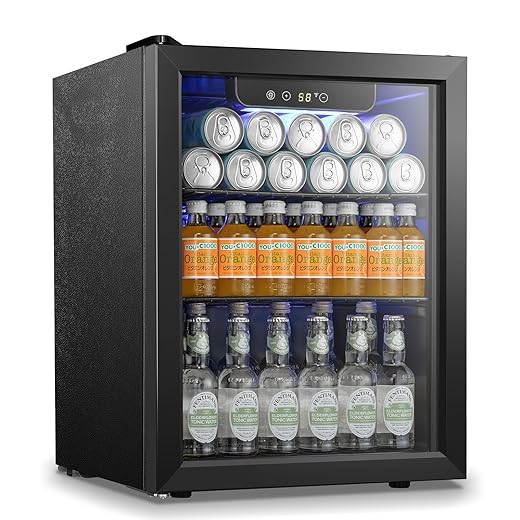







Beverage Coolers: The Ultimate Guide to Keeping Your Drinks Refreshingly Chilled
Beverage coolers are no longer just an accessory for parties and gatherings; they have become essential appliances for many households. Whether you’re a casual entertainer or a devoted connoisseur of fine beverages, having a dedicated space to store your drinks at the perfect temperature can enhance your enjoyment. But what exactly should you look for in a beverage cooler? Let’s dive into the world of beverage coolers—their benefits, types, and how to choose the right one for your needs.
Why Invest in a Beverage Cooler?
Imagine this: you’re hosting a backyard barbecue, and your guests are mingling, laughing, and asking for a cold drink. You reach for a warm can of soda from your fridge, and suddenly, the mood dampens. A beverage cooler can prevent these scenarios, ensuring your drinks are always at the ready, cool, and refreshing.
But it’s not just about convenience. A beverage cooler provides several advantages:
1. **Temperature Control**: These coolers often maintain a consistent temperature, keeping your drinks at the ideal chill level.
2. **Space-Saving**: With a designated cooler, your main refrigerator has more room for groceries while your drinks are organized and easily accessible.
3. **Versatility**: From beer to soda, wine to sparkling water, beverage coolers are designed to accommodate a variety of drink types.
Types of Beverage Coolers
When selecting a beverage cooler, it’s essential to understand the different types available on the market. Each serves unique purposes and fits various styles and spaces.
1. Freestanding Beverage Coolers
Freestanding models are the most common type. They can be placed anywhere in your home, from the kitchen to the living room or garage. These coolers typically have a larger capacity, making them perfect for storing multiple cases of drinks. However, ensure you allow enough space around them for proper ventilation.
2. Built-in Beverage Coolers
If you’re looking to integrate your cooler seamlessly into your kitchen cabinetry or bar area, a built-in model is your best bet. These coolers are designed to fit within your existing furniture and often come with a more polished finish. However, they may have a smaller capacity compared to freestanding options.
3. Mini Beverage Coolers
Perfect for smaller spaces, mini coolers are compact yet efficient. They can easily fit on countertops, in dorm rooms, or even in office spaces. While they may not hold as many drinks, they serve well for personal use or small gatherings.
Key Features to Consider
When choosing a beverage cooler, it’s essential to look for specific features that suit your needs. These include:
– **Capacity**: Consider how many drinks you want to store. Coolers come in various sizes, so choose one that aligns with your consumption habits.
– **Temperature Range**: Some coolers offer dual-zone capabilities, allowing you to store different types of beverages at varying temperatures. This feature is particularly useful for wine enthusiasts.
– **Shelving**: Adjustable shelves can maximize storage space, accommodating larger bottles or cans.
– **Noise Level**: If you’re sensitive to sound, look for models known for quiet operation. A loud compressor can be disruptive, especially in peaceful settings.
How to Maintain Your Beverage Cooler
Maintaining your beverage cooler is crucial for its longevity and performance. Here are some simple tips:
1. **Regular Cleaning**: Dust and spills can accumulate over time. Clean the interior and exterior regularly to keep your cooler looking and functioning well.
2. **Check the Seal**: Ensure the door seal is tight to maintain temperature efficiency. A faulty seal can lead to energy loss and inconsistencies in cooling.
3. **Temperature Monitoring**: Regularly check the temperature settings. Adjust them if necessary to ensure your drinks are always perfectly chilled.
Conclusion
In the world of refreshments, a beverage cooler is your best ally. It elevates your drinking experience, offering convenience, temperature control, and a stylish addition to your home. Whether you prefer a freestanding unit or a sleek built-in model, understanding your needs and key features can help you find the perfect cooler. So, the next time you host a gathering or simply want to enjoy a chill drink after a long day, you’ll be glad you made the investment.
FAQs
1. What’s the ideal temperature for a beverage cooler?
The ideal temperature for most beverages is between 35°F and 50°F. However, wine coolers typically operate best between 45°F and 65°F.
2. Can I use a beverage cooler for wine?
Yes, many beverage coolers are designed to accommodate wine, especially those with dual-zone temperature controls.
3. How much power does a beverage cooler consume?
Power consumption varies by model, but most beverage coolers use between 100 to 200 watts. Always check the specifications for energy efficiency ratings.
